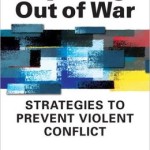World Health Day: Why Violent Conflict is a Health Issue
By Susan Collin Marks
We know that violence impacts our health, and the health of our societies. Physical violence can injure, maim and kill. Emotional violence can cripple our souls and do irreparable harm to our psyche. Structural violence that enshrines discrimination and oppression into society’s laws and culture can crush the spirit of its victims. Intuitively, we know that violence in whatever guise has a profoundly negative effect on our well-being.
A comprehensive 2002 report by the World Health Organization confirms this intuition and our experience that violence is bad for our health.[1] Nelson Mandela says in the foreword to the report that while the 20th century will be remembered for its wars and large scale violence, we must not forget the legacy of even more widespread day-to-day suffering through domestic violence, abuse, bullying and self-inflicted wounds. And a Centers for Disease Control and Prevention study cites violence as one of the top ten causes of death in the US for people up to age 64 in 2007.[2] Violence lurks not only in war zones in our cities and in the world, it also takes root in the individual human heart.
Health means wholeness.[3] It is the condition of being sound in body, mind, or spirit.[4]
It is often represented as a circle, that ancient symbol of oneness and infinity. It is the feeling we have when our bodies are well, our minds are clear, our spirit is settled, and we have peace in our hearts. Like grace, it is a gift that can never be asked for but only received.
Violence breaks the circle tearing the fabric of our lives and our societies, paralyzing us with fear, breaking trust, sending us scrambling for safety. It eats into our soul and ties knots in our stomach. It strikes terror into our hearts, changing us. In the grip of violent conflict, we often dehumanize the enemy, which allows us to attack because, in our minds, the other is no longer human. And perhaps even more insidiously, in order to dehumanize others, we have to first dehumanize ourselves, cutting ourselves off from the common humanity that binds us all together. Violence cuts us adrift from ourselves, and from each other, with far reaching consequences for perpetrator
and victim alike.
But it doesn’t have to be this way. Conflict and violence are not the same thing. Conflict is a normal part of human interaction, and is in fact a good thing. It is natural for people to have differences, and in fact it is these differences that keep society and our world dynamic, pushing us to find the best of competing views, ideas, and visions. The challenge is not to try the impossible – to eliminate differences – but to learn how to manage them constructively and without violence.
The good news is that violence is only one in a range of possible responses to conflict, which means that violent conflict is not inevitable. In fact, the opposite would seem to be true. Peace is much more prevalent on our planet than war; it just doesn’t make the headlines. Most people live their lives peacefully with their neighbors, working out their differences at home, in the workplace, and in their communities. Even internationally, most disputes are amicably settled. Every day, the world whirrs with cooperation – from telephone and postal services, to sharing scientific and academic data, to high-wire diplomacy.
Those of us who work as peacebuilders have learned that the best path to peace is prevention; just as preventive medicine seems to provide the optimal way to good health. We need to take responsibility for our health, and the health of those around us. Peace also starts with each of us. Remember Gandhi’s admonition we “be the change we wish to see in the world.”
Thus health and peace, ill-health and violent conflict, are pairs. To maintain peace and health, we need to attend to symptoms as they arise, quickly discover underlying causes, restore balance, and mend what is broken.
Each of us can make a contribution by choosing again and again to take care of ourselves and each other. This Cherokee proverb teaches us to mind ourselves first. The health and wellbeing of our planet, and all life, depends on it.
“There are two wolves fighting inside me,” the Cherokee Elder tells his grandchildren around the fire. “One is fearful, greedy, cruel, and violent. The other is gentle, kind, understanding, and generous. They have fought each other my entire life.”
“Which one wins, grandfather?” asks one of the children. Grandfather reflects.
“The one I feed,” he says.
__________________
Susan Collin Marks is Senior Vice President of Search for Common Ground. A native South African, Susan worked as a mediator and peacebuilder during her country’s transition from apartheid to democracy. Her book about that process, Watching the Wind: Conflict Resolution during South Africa’s Transition to Democracy (US Institute of Peace, 2000) was also published in Arabic in 2004. She has also overcome major illness, learning along the way how profoundly our individual wellbeing is tied up with the world around us, and vice versa.
[2] Violence as a Public Health Risk. ajl.sagepub.com/content/5/5/392.abstract
[3] Origin of the word health: O.E. hælþ “wholeness, a being whole, sound or well,” from PIE *kailo- “whole, uninjured, of good omen” (cf. O.E. hal “hale, whole;” O.N. heill “healthy;” O.E. halig, O.N. helge “holy, sacred;” O.E. hælan “to heal”). Healthy is first attested 1552. http://dictionary.reference.com/browse/health.
[4] Merriam-Webster Dictionary online.








